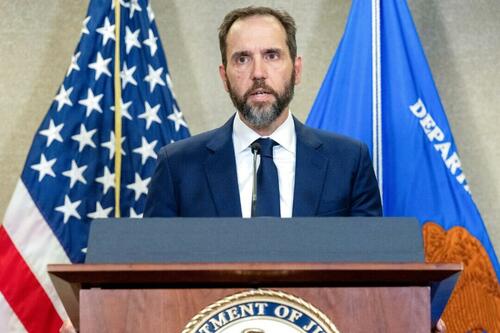
Authored by Sam Dorman via The Epoch Times,
Former President Donald Trump’s attorneys argued in a new filing on Oct. 24 that Special Counsel Jack Smith’s superseding indictment should be dismissed since his appointment was unconstitutional.
“Everything that Smith did since Attorney General [Merrick] Garland’s appointment, as President Trump continued his leading campaign against President Biden and then Vice President Harris, was unlawful and unconstitutional,” Trump’s attorneys said in a filing to D.C. Judge Tanya Chutkan, who is overseeing his election interference case.
“That includes Smith’s separate violation of the Appropriations Clause by relying on an appropriation that does not apply in order to take more than $20 million from taxpayers,” the filing added.
The filing was a motion requesting that Chutkan allow Trump to submit another motion to dismiss based on the legality of Smith’s appointment. Trump is seeking not only dismissal of the superseding indictment but also an injunction preventing Smith from “spending additional public funds” while violating the Constitution.
It’s the latest attempt by Trump to obtain rulings that would severely weaken or end Smith’s prosecution, which restarted after months of delay as the Supreme Court weighed Trump’s appeal on presidential immunity.
Trump is seeking to dismiss the case based on the Supreme Court’s ruling that presidents have some immunity, as well as based on its decision from June in Fischer v. United States, which narrowed Smith’s application of an obstruction statute used against Jan. 6 defendants.
Trump’s latest filing echoes arguments from Florida Judge Aileen Cannon, who dismissed Smith’s classified documents case against Trump in the state. Both Trump and Cannon also cited Supreme Court Justice Clarence Thomas, whose concurring opinion in the immunity decision raised doubts about the legitimacy of Smith’s appointment.
That case is headed towards the U.S. Court of Appeals for the 11th Circuit where Smith is seeking an appeal of Cannon’s decision. If the 11th Circuit and Chutkan return differing opinions on this issue, it could prompt the type of circuit split that reaches the Supreme Court.
Chutkan has already indicated that she would reject the type of arguments that Cannon used in dismissing the classified documents case. During a status conference on Sept. 5, she said that she didn’t find Cannon’s opinion “particularly persuasive.”
Cannon’s ruling conflicted with a 2019 judgment by the U.S. Court of Appeals for the District of Columbia Circuit, which upheld former special counsel Robert Mueller’s appointment. That 2019 decision wasn’t binding for Chutkan, Trump’s attorneys argued, because it was decided before the Supreme Court issued multiple decisions attempting to rein in agency power through a principle called the “major questions doctrine.”
That doctrine, which the Supreme Court applied in its decision striking down President Joe Biden’s student loan forgiveness, holds that laws should not be interpreted as allowing agencies to decide major questions unless explicitly stated by the text.
Because Congress didn’t provide a clear statement authorizing the appointment of special counsels like Smith, Trump’s attorneys said, his appointment was illegal.
Smith told the 11th Circuit that Cannon’s decision “needlessly casts doubt on longstanding practices in the Department of Justice and across the Executive Branch.”
He disputed Cannon’s ruling on statutory grounds but also took issue with her interpretation of the Supreme Court’s decision in U.S. v. Nixon. That case centered on former President Richard Nixon’s attempt to resist a subpoena from special prosecutor Leon Jaworski.
In that case, the court’s majority defended the special prosecutor’s appointment.
“Under the authority of Art. II, § 2, Congress has vested in the Attorney General the power to conduct the criminal litigation of the United States Government ... It has also vested in him the power to appoint subordinate officers to assist him in the discharge of his duties,” the 1974 majority opinion, authored by Chief Justice Warren Burger, read.
Cannon said in July that the court’s wording was dictum, or nonbinding, on future court decisions. Trump’s attorneys agreed.
Authored by Sam Dorman via The Epoch Times,
Former President Donald Trump’s attorneys argued in a new filing on Oct. 24 that Special Counsel Jack Smith’s superseding indictment should be dismissed since his appointment was unconstitutional.
“Everything that Smith did since Attorney General [Merrick] Garland’s appointment, as President Trump continued his leading campaign against President Biden and then Vice President Harris, was unlawful and unconstitutional,” Trump’s attorneys said in a filing to D.C. Judge Tanya Chutkan, who is overseeing his election interference case.
“That includes Smith’s separate violation of the Appropriations Clause by relying on an appropriation that does not apply in order to take more than $20 million from taxpayers,” the filing added.
The filing was a motion requesting that Chutkan allow Trump to submit another motion to dismiss based on the legality of Smith’s appointment. Trump is seeking not only dismissal of the superseding indictment but also an injunction preventing Smith from “spending additional public funds” while violating the Constitution.
It’s the latest attempt by Trump to obtain rulings that would severely weaken or end Smith’s prosecution, which restarted after months of delay as the Supreme Court weighed Trump’s appeal on presidential immunity.
Trump is seeking to dismiss the case based on the Supreme Court’s ruling that presidents have some immunity, as well as based on its decision from June in Fischer v. United States, which narrowed Smith’s application of an obstruction statute used against Jan. 6 defendants.
Trump’s latest filing echoes arguments from Florida Judge Aileen Cannon, who dismissed Smith’s classified documents case against Trump in the state. Both Trump and Cannon also cited Supreme Court Justice Clarence Thomas, whose concurring opinion in the immunity decision raised doubts about the legitimacy of Smith’s appointment.
That case is headed towards the U.S. Court of Appeals for the 11th Circuit where Smith is seeking an appeal of Cannon’s decision. If the 11th Circuit and Chutkan return differing opinions on this issue, it could prompt the type of circuit split that reaches the Supreme Court.
Chutkan has already indicated that she would reject the type of arguments that Cannon used in dismissing the classified documents case. During a status conference on Sept. 5, she said that she didn’t find Cannon’s opinion “particularly persuasive.”
Cannon’s ruling conflicted with a 2019 judgment by the U.S. Court of Appeals for the District of Columbia Circuit, which upheld former special counsel Robert Mueller’s appointment. That 2019 decision wasn’t binding for Chutkan, Trump’s attorneys argued, because it was decided before the Supreme Court issued multiple decisions attempting to rein in agency power through a principle called the “major questions doctrine.”
That doctrine, which the Supreme Court applied in its decision striking down President Joe Biden’s student loan forgiveness, holds that laws should not be interpreted as allowing agencies to decide major questions unless explicitly stated by the text.
Because Congress didn’t provide a clear statement authorizing the appointment of special counsels like Smith, Trump’s attorneys said, his appointment was illegal.
Smith told the 11th Circuit that Cannon’s decision “needlessly casts doubt on longstanding practices in the Department of Justice and across the Executive Branch.”
He disputed Cannon’s ruling on statutory grounds but also took issue with her interpretation of the Supreme Court’s decision in U.S. v. Nixon. That case centered on former President Richard Nixon’s attempt to resist a subpoena from special prosecutor Leon Jaworski.
In that case, the court’s majority defended the special prosecutor’s appointment.
“Under the authority of Art. II, § 2, Congress has vested in the Attorney General the power to conduct the criminal litigation of the United States Government … It has also vested in him the power to appoint subordinate officers to assist him in the discharge of his duties,” the 1974 majority opinion, authored by Chief Justice Warren Burger, read.
Cannon said in July that the court’s wording was dictum, or nonbinding, on future court decisions. Trump’s attorneys agreed.
Loading…





